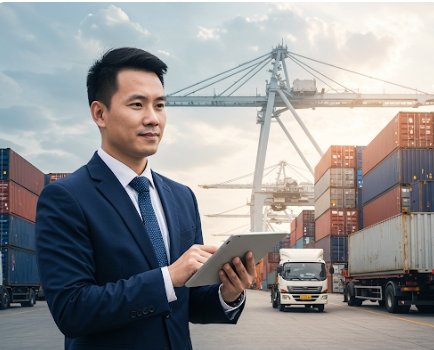In the entire international express delivery chain, customs clearance is the essential checkpoint for goods to enter the importing country from the exporting country. Customs brokerage refers to a service where a qualified third-party organization (a customs broker, international courier, or its partner) handles customs declarations, submits documents, and pays taxes and fees at the importing country’s customs on behalf of the consignor or consignee.
Simply put, customs brokerage means letting “experts handle the professional work.” Due to the significant differences in customs policies, declaration rules, and tax systems across countries, it can be difficult for beginners to complete the customs clearance process efficiently. Customs brokerage agencies, with their expertise and experience, help goods pass customs inspections quickly, avoiding detentions, delays, or penalties due to operational errors.
- Why do you need a customs clearance agent? (Core reasons even beginners must understand)
For individual shippers or small and medium-sized enterprises, self-clearing customs is often a “daunting task.” The value of a customs clearance agent lies in three key areas:
Resolving “professional barriers”: Customs declaration requirements for goods in various countries are extremely detailed (such as HS code classification, product description standards, and proof of origin requirements). Non-professionals can easily make “incorrect declarations” (such as classifying “Bluetooth headphones” as “ordinary headphones”), leading to customs inspections and detentions. Customs clearance agents are familiar with the regulations of each country and can accurately complete declarations.
Saving “time and effort”: Customs clearance involves multiple steps, including document preparation, system declaration, customs connection, and tax payment. Doing it yourself requires repeated research on policies and contact with customs authorities, which can take days or even weeks. Customs clearance agents offer a “one-stop” solution, significantly reducing customs clearance time.
Avoiding “Compliance Risk”: Some goods (such as electrical products, cosmetics, and medical devices) require advance import licenses and certification documents (such as EU CE and US FDA). Failure to complete these documents before declaring may result in confiscation of goods and heavy fines. Customs clearance agents will verify these documents in advance to ensure compliance.
II. What is the core process of customs clearance agents? (Full breakdown)
Customs clearance agents are not simply submitting documents; rather, they are a standardized, professional operation that typically includes six key steps:
Receiving customs clearance documents: International courier companies (such as DHL and FedEx) or shippers submit core documents to the customs clearance agent, including commercial invoices, packing lists, air waybills, and cargo declaration elements (commodity name, HS code, quantity, weight, value, country of origin, etc.). Some special goods also require certification documents and import licenses.
Document Review and Pre-Declaration: The customs clearance agent first verifies the completeness and consistency of the documents (e.g., whether the invoice amount matches the declared value, and whether the HS code is appropriate for the goods) to avoid errors or omissions. The customs clearance agent then submits the electronic declaration information to the importing country’s customs online system, generating a “Customs Clearance Declaration Form.”
Customs Review and Inspection (if applicable): After receiving the declaration information, customs will conduct either a “machine review” or a “manual review.”
If the information is correct and the goods are compliant, customs will directly approve the review and issue a “Tax and Fee Notice.”
If the declared information is questionable (e.g., the value is too low, the product name is unclear), or if the goods fall into a high-risk category, customs will request a “Goods Inspection.” The customs clearance agent will assist in arranging the goods to be moved to the inspection area and cooperate with customs in unpacking and verification.
Calculation and Payment of Taxes: The customs clearance agent calculates the taxes payable based on the tax rates (customs duties, VAT, consumption tax, etc.) approved by the customs authorities. The agent then notifies the consignee to pay the taxes (or advances the taxes and then recovers them from the consignee as agreed upon). The taxes and fees are then remitted to the customs designated account.
Customs Release: After taxes and fees are paid and all audits are passed, the customs authorities will issue a “Release Notice,” which the customs clearance agent will then forward to the international courier or airport warehouse.
Goods Handover and Follow-up: Upon receiving the Release Notice, the warehouse will transfer the goods to the courier’s final delivery link for final delivery to the consignee. The customs clearance agent will retain the customs clearance documents for subsequent inquiries or verification by the consignee and sender.
- Common Types of Customs Clearance Agents: Who Handles Customs Clearance for You?
For international express delivery, customs clearance agents are primarily provided by two types of entities, serving slightly different service scenarios:
International express delivery companies’ own customs clearance services (mainstream model). Major express delivery companies such as DHL, FedEx, UPS, and SF Express International all have their own or partnered customs clearance teams in major countries around the world, providing integrated “express delivery + customs clearance” services. For the sender, this model is virtually “zero-effort”—simply fill in the correct cargo information and provide basic documents when sending the shipment, and the express delivery company will automatically handle the customs clearance process, eliminating the need for the recipient to interact with a third party. If additional information is required for customs clearance, the express delivery company will contact the recipient directly, making the process more efficient.
Third-party professional customs clearance agencies (supplementary model) are used when the shipment is “sensitive” (such as cosmetics and electrical products), “high-value” (such as luxury goods and precision equipment), or “specialty” (such as medical devices and food), and the express delivery company’s regular customs clearance channels are unable to handle it. These customs clearance agencies specialize in specific categories or countries, possessing extensive experience handling specialized cargo. They can address challenges that “regular customs clearance” cannot handle. However, they require the consignee or sender to proactively engage with them, making the process relatively complex.
Four Essential Things Newbies Need to Know About Customs Clearance with Agents (A Guide to Avoiding Pitfalls)
Provide truthful cargo information and avoid underreporting. Some newbies may conceal the cargo category (e.g., writing “cosmetics” as “daily necessities”) or understate the value (e.g., reporting a 1,000 yuan shipment as 100 yuan) to avoid paying taxes. However, customs clearance agencies conduct rigorous inspections. If discovered by customs, the shipment will be detained, requiring not only the consignee to pay the taxes but also potential fines, which may affect the recipient’s subsequent customs clearance credit.
Confirm in advance the customs clearance fees (customs clearance service fee) and import taxes and fees (tariffs, VAT) charged by the “customs clearance responsible party” and “tax bearer.” These fees are two separate items:
Customs clearance service fees are usually borne by the sender or recipient as agreed upon (if using an integrated courier service, some of these fees will be included in the courier fee);
Import taxes and fees are generally borne by the recipient (known as “collectable tax”), though in rare cases, the sender may prepay them in advance (known as “prepaid tax”).
Be sure to confirm clearly with the courier or agent before shipping to avoid customs clearance delays due to disputes over fees.
Maintain open communication channels and promptly provide additional documentation. If customs requires additional documentation (such as recipient identification, description of the goods’ intended use, and certificate of origin), the customs clearance agent or courier will notify the recipient by phone or email. Please ensure you respond within 1-2 business days. Failure to provide additional documentation within this timeframe may result in the shipment being returned, resulting in significant return shipping fees.
Confirm customs clearance feasibility in advance for special shipments such as food, pharmaceuticals, and animal and plant products. Most countries have strict import restrictions (for example, China prohibits individuals from mailing unquarantined meat products). Before shipping, be sure to confirm customs clearance with your courier or customs clearance agent to avoid losses caused by customs destruction after shipment.
If you have any international logistics service needs, please contact us by clicking the floating chat icon in the lower right corner or using the other contact options in the lower right corner of the page!




